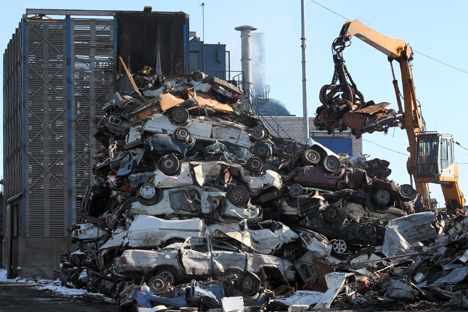European Union may sue Russia in WTO court

The reason for the dissatisfaction is the car recycling tax. Source: ITAR-TASS
Europe may initiate the first lawsuit against Russia since Russia's accession to the World Trade Organization (WTO). The reason for the dissatisfaction is the car recycling tax that, in the opinion of EU members, places European manufacturers in disadvantageous conditions and goes against the WTO's ground rules.
The Europeans were expecting this tax to be abolished on July 1, in accordance with the hope expressed by European Commission president, José Manuel Barroso around a month ago.
In the words of Karel De Gucht, the European trade commissioner, the European powers recognize the need for an incentive for automobile recycling, and in the EU there is an analogous law. However, this law does not involve the use of taxes and tariffs as a prime tool.
Manufacturers operating in Russia can avoid paying the new tax if they provide a guarantee of safe recycling of automobiles in the future. For example, Kira Zavyalova, an analyst at Investcafe, said that AvtoVAZ, GAZ, KAMAZ and Sollers have taken this action.
The profit from the difference in taxation can be received now, while the expenses from recycling come into effect in about 15 years.
Earlier, Maksim Medvedkov, the lead Russian negotiator with the WTO and the head of the Department for Trade Negotiations of the Ministry of Economic Development of the Russian Federation, said that Russia does not consider this tax as discriminatory against foreign business or contradictory to the accords.
However, under pressure from Brussels, the Russian government developed and introduced to the Duma draft legislation according to which the tax would also be levied on Russian manufacturers.
But the Duma, which is generally active in supporting government legislation, did not find the time to examine the proposal by the Ministry of Economic Development.
The introduction of the tax coincided with the beginning of the lowering of a tax on both the new and used car markets, recalled Mikhail Lezhov, head of the marketing and advertising department of Formula 91.
According to his data, some auto manufacturers reacted to this with a minor price increase: for example, at the Toyota Motor Corporation, the recommended retail prices on some cars were raised by an average of 0.5 to 1.7 percent.
“Europe always observes rules rather strictly; there can be no exceptions. Russia somewhat blatantly tried to violate the rules, and this triggered the corresponding protest against it,” Lezhov said.
In addition, according to Zavyalova, even if Brussels turns to the courts, it is unlikely that the matter will go to trial. Russia has two months to reach a compromising solution. In the fall, the government will likely pass amendments extending the tax to the Russian auto industry.
Consequently, the reason for the claim will simply be moot.
Moreover, Russia now intends to use another measure to stimulate car sales: subsidizing rates for automobile credit. Yet rejecting additional taxes while oil prices are falling and while there is obviously a hole in the budget would be misguided. The car recycling tax thus makes it possible to add around 54 billion rubles ($1.8 billion) to the coffers.
That said, Lezhov believes, no one intends to actually engage in recycling in Russia.
“The tax was simply held up as a recycling tax, but having said that, no concrete plans for creating recycling facilities, including the regions where they would be built, the projected volumes to be processed, the technologies to be introduced, or the possibilities for using recycled raw materials were published.
The upholding of obstacles to importing secondhand cars from abroad was the key goal. This goal was achieved: there are imports, but in a microscopic volume.”
In addition, a complete abolition of the car recycling tax will bring definite bonuses to consumers, analysts assert. “The product line will increase significantly as it is not a secret that in Russia not many models are sold new because their prices are often considerably higher than in the United States or Europe.
For manufacturers of new cars, this could be critical as there is a tendency toward expenditure switching between a new car and a secondhand car that is two to three years old,” Lezhov noted.
First published in Russian in Rosbalt
All rights reserved by Rossiyskaya Gazeta.
Subscribe
to our newsletter!
Get the week's best stories straight to your inbox

